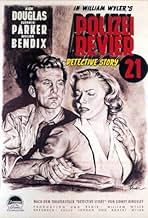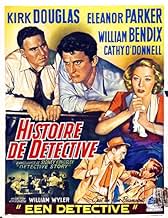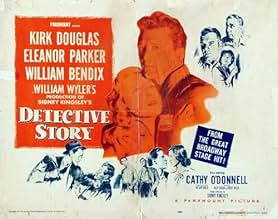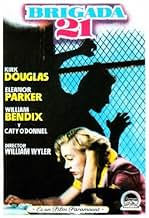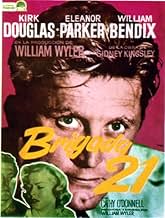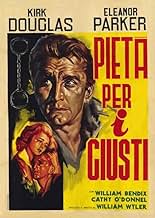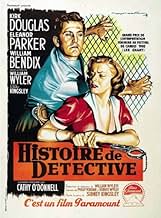AVALIAÇÃO DA IMDb
7,5/10
10 mil
SUA AVALIAÇÃO
Em um dia, na sala do esquadrão da 21ª Delegacia, diversos personagens formam o pano de fundo para os problemas do obstinado detetive Jim McLeod.Em um dia, na sala do esquadrão da 21ª Delegacia, diversos personagens formam o pano de fundo para os problemas do obstinado detetive Jim McLeod.Em um dia, na sala do esquadrão da 21ª Delegacia, diversos personagens formam o pano de fundo para os problemas do obstinado detetive Jim McLeod.
- Direção
- Roteiristas
- Artistas
- Indicado a 4 Oscars
- 7 vitórias e 11 indicações no total
William 'Bill' Phillips
- Det. Pat Callahan
- (as William 'Bill' Phillips)
- Direção
- Roteiristas
- Elenco e equipe completos
- Produção, bilheteria e muito mais no IMDbPro
Avaliações em destaque
This top-notch police story rises far above the norm for its type. A true example of ensemble acting, the film incorporates many well-known character actors all putting in first-rate work, led by the superb efforts of Kirk Douglas and William Bendix, the latter in what may be his best screen role. This may be one of the earliest examples of the "typical day" genre, in which multiple story lines occurring in a single day in a certain locale are melded into a whole (a genre exemplified by the "Hill Street Blues" and "Barney Miller" of tv). An excellent script and good direction, aided by interesting characters, keep the dramatic tension moving along briskly to the searing conclusion. This is not your run-of-the-mill police story, and is definitely worth a see.
William Wyler, who won three Oscars for Best Director ("Mrs. Miniver", "The Best Years of Our Lives", "Ben-Hur"), and been nominated a record 12 times between 1937 and 1966, is not often thought of as one of our "great" directors. Truly, he was. Here, with the filmization of Sidney Kingsley's stage play about a NYC police station, focusing on the amazingly bad day which has been happening to Detective Kirk Douglas, Wyler shows his skill and diversity.
Kirk Douglas is the vision of a crumbling spirit disguised by toughness and authority. He towers over a stellar cast, including Eleanor Parker as his wife, William Bendix as one of the other officers in the precinct, and Lee Grant as an inexperienced shoplifter. The one actor who truly stands out from the rest is Joseph Wiseman, who is simply a spark plug made up as an actor, giving an astounding recreation of his stage role as an on-edge, cheap suit-wearing thief. He displays the physical dexterity of James Cagney in the physique of a beanstalk, and proves to be more dangerous than any other movie crook we'd seen in the past.
In one of the great Oscar follies of our time (and there were many), the 1952 voters neglected to nominate Douglas as Best Actor, or Wiseman in a supporting slot. Nominations were given out for Wyler's direction, the screenplay, and for Parker and Grant, lead and supporting actresses respectively. None for Best Picture, the other nominations were passed over in favor of "A Place in the Sun" and "A Streetcar Named Desire". And who was picked for Best Picture? Well, staying true to AMPAS's mission of picking only the most harmless movie of the year ("Driving Miss Daisy", "Chariots of Fire", "Shakespeare in Love"), instead of the best, they picked "An American in Paris", which will be remembered by film historians as merely a rehearsal for "Singin' in the Rain". Oh, well.
Kirk Douglas is the vision of a crumbling spirit disguised by toughness and authority. He towers over a stellar cast, including Eleanor Parker as his wife, William Bendix as one of the other officers in the precinct, and Lee Grant as an inexperienced shoplifter. The one actor who truly stands out from the rest is Joseph Wiseman, who is simply a spark plug made up as an actor, giving an astounding recreation of his stage role as an on-edge, cheap suit-wearing thief. He displays the physical dexterity of James Cagney in the physique of a beanstalk, and proves to be more dangerous than any other movie crook we'd seen in the past.
In one of the great Oscar follies of our time (and there were many), the 1952 voters neglected to nominate Douglas as Best Actor, or Wiseman in a supporting slot. Nominations were given out for Wyler's direction, the screenplay, and for Parker and Grant, lead and supporting actresses respectively. None for Best Picture, the other nominations were passed over in favor of "A Place in the Sun" and "A Streetcar Named Desire". And who was picked for Best Picture? Well, staying true to AMPAS's mission of picking only the most harmless movie of the year ("Driving Miss Daisy", "Chariots of Fire", "Shakespeare in Love"), instead of the best, they picked "An American in Paris", which will be remembered by film historians as merely a rehearsal for "Singin' in the Rain". Oh, well.
A play which tells the story of a day in the lives of the several people who populate a police precinct translates more or less transparently between mediums, though with its theatrical pace results in a vigorous, enthralling drama with a solid, receptive cast. Kirk Douglas, playing the central cop, a brooding maverick who can't stand having to stop at the line between law and vengeance, is very intense in particular, the breadth of view of a crystallizing soul masqueraded by rigor and command, which makes for some delicate scenes with his wife, Eleanor Parker. The very natural William Bendix is one of the other officers in the precinct, a cop with a delicate sensibility, the clear contrast to the uncompromising protagonist. But the film's brightest highlights are the few moments dominated by the brilliant Lee Grant, whose character seems non-sequitary yet has a refreshing outside-world quality. Dense with lively exhibitions of the sort of devil-may-care influx that transits and languishes through a workday of plainclothes detectives, it is a police procedural not in the traditional sense. There is no central case over which our detectives toil. There is simply an allotment of arrests and conflicting views on the confines of police work.
While this Edgar-winning cop drama stays in effect a filmed play, William Wyler uses the innate limitations of such a project as a creative outlet, as well as his widely known grating approach multiple retakes. The cooped up setting is not just a space where all manner of characters eyeball each other and interplay. It complements the lurking gist of the story's thematic elements and overall to the film's dramatic impact. The staging of the individual scenes, which a lot of the time plays on foreground-background relationships, is intensified by Lee Garmes's deep-focus cinematography, a consistent device used by Wyler throughout his body of work no matter how much he diversifies in genre and tone.
The core of Wyler's consistency throughout his tremendous career is his insistence on emotional truth, thus his enraging approach to directing actors, and thus his track record with directing Oscar-nominated and Oscar-winning performances. Wyler's discretion of angle exposes or intimates more character than the last and apprehends the decisive sensibility to give significance to the experience of seeing the film. He didn't coin anything new. He didn't use unprecedented angles or logistically fussy dolly takes. He's discerning from the acknowledged bill of fare of long shot, medium shot and close-up as the atmosphere of the scene calls for.
While this Edgar-winning cop drama stays in effect a filmed play, William Wyler uses the innate limitations of such a project as a creative outlet, as well as his widely known grating approach multiple retakes. The cooped up setting is not just a space where all manner of characters eyeball each other and interplay. It complements the lurking gist of the story's thematic elements and overall to the film's dramatic impact. The staging of the individual scenes, which a lot of the time plays on foreground-background relationships, is intensified by Lee Garmes's deep-focus cinematography, a consistent device used by Wyler throughout his body of work no matter how much he diversifies in genre and tone.
The core of Wyler's consistency throughout his tremendous career is his insistence on emotional truth, thus his enraging approach to directing actors, and thus his track record with directing Oscar-nominated and Oscar-winning performances. Wyler's discretion of angle exposes or intimates more character than the last and apprehends the decisive sensibility to give significance to the experience of seeing the film. He didn't coin anything new. He didn't use unprecedented angles or logistically fussy dolly takes. He's discerning from the acknowledged bill of fare of long shot, medium shot and close-up as the atmosphere of the scene calls for.
Some films are so full of life they have to be seen again and again. I first saw this one in my early teens and loved it, despite difficulty in understanding it. Decades later I still love it, and always will. It has its flaws: everybody overacts (beautifully), as if on stage. The writing is a bit too well-structured, almost like clockwork, the characters are a bit too symbolic and easy to categorise. The comic relief kicks in just on schedule. The psychological diagnosis is too precise. And yet, this is one of the greatest films ever made. It has a sense of respect for the totality of life, and makes tragedy almost poetic. Fascinating though the plot may be, the essence of this film goes beyond plot. It's a symphony of cacophony. The playwright would have made a fine composer.
The film is the story of a great detective who didn't know he was trailing his own heartbreak . Brought by William Wyler , Academy Award Winner who gave ¨The best years of our lives¨ and Pulitzer Price Winner Sidney Kingsley , author of ¨Dead end¨ and featuring of the cast that made from the smash Broadway play so sensational about a love with no punches pulled . The picture talks the events at a N.Y.C. police precinct .
Excellent casting with Kirk Douglas as an angry , grumpy and violent police with obsession to imprison a doctor played by George MacReady , Eleanor Parker as the loved wife with a terrible secret , William Bendix as a good , agreeable policeman , Joseph Wiseman as a hysterical thief and Lee Grant who was prized in Cannes festival to the best female interpretation . Cameraman Lee Garmes makes an exceptional cinematography reflecting splendid images in white and black photography plenty of lights and darks , typical of noir cinema . And uncredited John F Seitz who filmed the last three weeks of production . Lee Garmes along with Nicholas Musuruca , John Seitz and John Alton cinematographers are the fundamental artifices of this expressionist cinema or ¨Film Noir¨full of dark and portentous frames . William Wyler direction is magnificent , blending documentary and police critical , he realized this exciting adaptation at a theater until the actors learned the dialog and , after that , he made a quick shooting . The film was nominated for Academy Award Winner to screenplay , Philip Yordan , Robert Wyler , (director's brother) , Eleanor Parker as main actress and Lee Grant as secondary actress . Support cast is frankly excellent such as Horace McMahon, Joseph Wiseman, Michael Strong and Lee Grant , all of them re-enacted their stage roles . Being film debut of Lee Grant and Burt Mushin .
The motion picture was compellingly directed by the great maestro William Wyler . Wyler was considered by his peers as second only to John Ford as a master craftsman of cinema and the winner of three Best Director Academy Awards . Wyler was a great professional who had a career full of successes in all kind of genres as Film Noir : ¨Detective story¨ , ¨The desperate hours¨ , ¨Dead End¨ ; Western : ¨The Westener¨, ¨Friendly persuasion¨ , ¨Big Country¨ , but his speciality were dramas as : ¨Jezebel¨ , ¨The letter¨ , ¨Wuthering Heights¨ , ¨The best years of our lives¨, ¨Mrs Miniver¨, ¨The heiress¨ , ¨the little Foxes¨ , ¨The collector¨ and Comedy as two films starred by Audrey Hepburn : ¨How to steal a million¨ and of course ¨Roman's holiday¨ with Audrey at her Oscar-winning best and immortal comedy-romance. Furthermore , his greatest hit was the Super-Oscarized ¨Ben-Hur¨. ¨Detective story¨resulted to be a great film , nowadays very well considered . Rating : Better than average . Well worth watching .
Excellent casting with Kirk Douglas as an angry , grumpy and violent police with obsession to imprison a doctor played by George MacReady , Eleanor Parker as the loved wife with a terrible secret , William Bendix as a good , agreeable policeman , Joseph Wiseman as a hysterical thief and Lee Grant who was prized in Cannes festival to the best female interpretation . Cameraman Lee Garmes makes an exceptional cinematography reflecting splendid images in white and black photography plenty of lights and darks , typical of noir cinema . And uncredited John F Seitz who filmed the last three weeks of production . Lee Garmes along with Nicholas Musuruca , John Seitz and John Alton cinematographers are the fundamental artifices of this expressionist cinema or ¨Film Noir¨full of dark and portentous frames . William Wyler direction is magnificent , blending documentary and police critical , he realized this exciting adaptation at a theater until the actors learned the dialog and , after that , he made a quick shooting . The film was nominated for Academy Award Winner to screenplay , Philip Yordan , Robert Wyler , (director's brother) , Eleanor Parker as main actress and Lee Grant as secondary actress . Support cast is frankly excellent such as Horace McMahon, Joseph Wiseman, Michael Strong and Lee Grant , all of them re-enacted their stage roles . Being film debut of Lee Grant and Burt Mushin .
The motion picture was compellingly directed by the great maestro William Wyler . Wyler was considered by his peers as second only to John Ford as a master craftsman of cinema and the winner of three Best Director Academy Awards . Wyler was a great professional who had a career full of successes in all kind of genres as Film Noir : ¨Detective story¨ , ¨The desperate hours¨ , ¨Dead End¨ ; Western : ¨The Westener¨, ¨Friendly persuasion¨ , ¨Big Country¨ , but his speciality were dramas as : ¨Jezebel¨ , ¨The letter¨ , ¨Wuthering Heights¨ , ¨The best years of our lives¨, ¨Mrs Miniver¨, ¨The heiress¨ , ¨the little Foxes¨ , ¨The collector¨ and Comedy as two films starred by Audrey Hepburn : ¨How to steal a million¨ and of course ¨Roman's holiday¨ with Audrey at her Oscar-winning best and immortal comedy-romance. Furthermore , his greatest hit was the Super-Oscarized ¨Ben-Hur¨. ¨Detective story¨resulted to be a great film , nowadays very well considered . Rating : Better than average . Well worth watching .
Você sabia?
- CuriosidadesFilm debut of Lee Grant who was nominated for an Oscar, before being blacklisted for refusing to testify against then-husband Arnold Manoff.
- Erros de gravaçãoIn some of the close-up shots of McLeod and Schneider in the back of the paddy wagon, McLeod's shadow can be faintly seen on the rear-projection screen showing the street behind them. (Other shadows can also be seen.)
- Citações
Detective James McLeod: I built my whole life on hating my father. All the time he was inside me, laughing.
- ConexõesFeatured in Paramount Presents (1974)
Principais escolhas
Faça login para avaliar e ver a lista de recomendações personalizadas
- How long is Detective Story?Fornecido pela Alexa
Detalhes
- Data de lançamento
- País de origem
- Idioma
- Também conhecido como
- Detective Story
- Locações de filme
- Empresa de produção
- Consulte mais créditos da empresa na IMDbPro
- Tempo de duração1 hora 43 minutos
- Cor
- Proporção
- 1.37 : 1
Contribua para esta página
Sugerir uma alteração ou adicionar conteúdo ausente

Principal brecha
By what name was Chaga de Fogo (1951) officially released in India in English?
Responda

